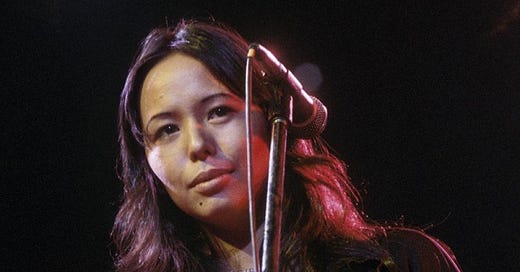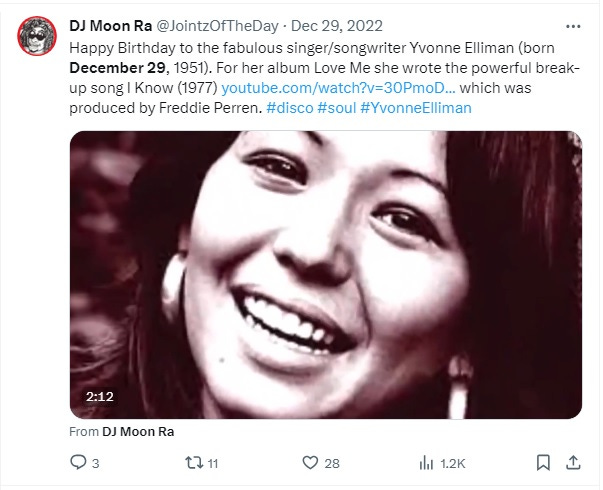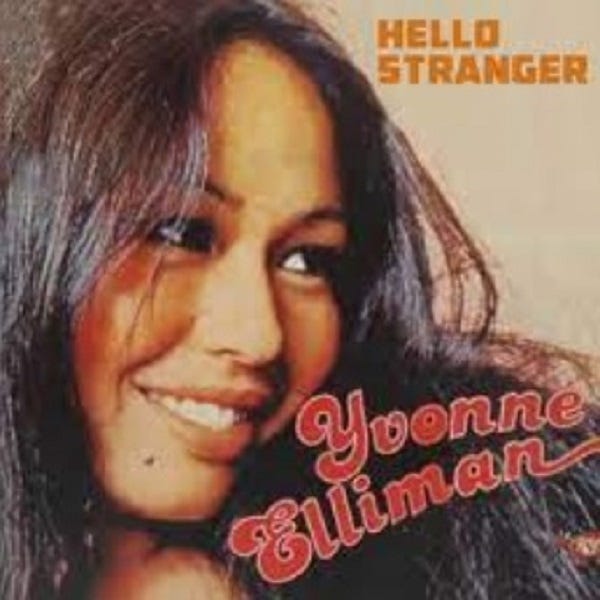Yvonne Elliman (born December 29, 1951) – Who's Gonna Save The World? (1975)
The talented singer/songwriter wrote this profound message song for her Rising Sun LP, produced by Steve Cropper of Booker T. & the M.G.'s.
Watch full video on Twitter.
View most updated version of this post on Substack.
Open YouTube playlist of all songs in this post.
The very talented singer/songwriter Yvonne Elliman first burst onto the scene playing the role of Mary Magdalene in the original album, Broadway and film productions of Jesus Christ Superstar in the early 1970s. She then launched a solo career and released several albums throughout the rest of the decade, peaking in 1977 with her #1 hit single “If I Can't Have You” from the Saturday Night Fever soundtrack.
Born and raised in Honolulu, Hawaii, Yvonne Marianne Elliman learned to play the ukulele when she was four and was playing the piano by age seven. In high school, she and several classmates formed a folk rock band called We Folk, in which she sang and played guitar. She often skipped class during her senior year, and only graduated thanks to the school’s band director convincing other teachers to let her pass their classes. He was from London, and persuaded her to move there after high school and try to break into the music business.
Arriving in 1969, she began singing in small nightclubs, where she was soon spotted by Tim Rice and Andrew Lloyd Webber. They had written an epic rock opera called Jesus Christ Superstar, but were unable to find financial backing to mount a full production. Instead they had decided to release the musical as a concept album. They brought Elliman into the studio to sing the female lead part of Mary Magdalene, opposite Deep Purple lead singer Ian Gillan as Jesus.
Released in the fall of 1970, the album was massively successful. It hit #6 on the UK album charts, and #1 on the Billboard 200 for two months in early 1971, becoming the biggest-selling album of the year. Elliman reprised her role in the first authorized U.S. production of the opera in July, 1971, which took place in Pittsburgh and featured Carl Anderson as Judas. She then joined the cast when the show opened on Broadway, a production that ran from October, 1971 to June, 1973. She also reprised her role in the film version, shot on location in Israel and released in the U.S. during the summer of 1973, for which she was nominated for a Golden Globe for Best Actress.
Lloyd Webber and Rice co-produced Elliman’s self-titled debut solo LP, released on Decca Records in 1972. Notable session players included David Spinozza on guitar, Hugh McCracken on guitar and harmonica, Ken Ascher on piano and organ, and Ralph McDonald on percussion.
Besides “I Don't Know How To Love Him,” Mary Magdalene’s main number from Jesus Christ Superstar, the album mostly featured Elliman covering lesser-known rock songs. But her voice was superb on everything, and the one track she wrote, “Interlude For Johnny,” was a heartfelt acoustic gem that showed she had promise as a songwriter. She also did a phenomenal version of “Can't Find My Way Home,” which Steve Winwood wrote in 1969 for supergroup Blind Faith’s only album.
Other highlights included the LP’s superb opening cut “Look at You, Look at Me,” the stellar jam “World in Changes” (both written by Dave Mason), and the epic “I Would Have Had a Good Time,” written by South African-born songwriter John Kongos.
Elliman’s second album Food of Love was released in 1973 on Deep Purple’s MCA imprint, Purple Records. It featured the upbeat folk-rock anthem “Sunshine,” written by David MacIver and Rupert Hine (the latter who played keyboards on the LP), and the autobiographical “Hawaii,” which Elliman wrote.
While she was appearing on Broadway, Elliman married her first husband Bill Oakes, who was President of RSO Records, the label owned by Jesus Christ Superstar producer Robert Stigwood. She was eventually signed to RSO herself and asked to contribute backing vocals to Eric Clapton's version of Bob Marley’s “I Shot The Sheriff,” which went all the way to #1 on the Billboard Hot 100 in 1974.
She joined Clapton’s touring band and sang on several of his classic solo albums including 461 Ocean Boulevard (1974) and Slowhand (1977). Elliman began regularly performing “Can't Find My Way Home” as a solo acoustic number during concerts with Clapton, which allowed him to take a break. As a member of Blind Faith alongside Steve Winwood, Clapton had played guitar on the original track.
Original Booker T. & the M.G.’s guitarist and superstar producer Steve Cropper was enlisted to produce her first album released on RSO, Rising Sun (1975). Cursed with truly awful cover art, the album did not sell well and had no hit singles despite the quality of its songs.
Cropper played acoustic guitar and provided backing vocals on the heartfelt “Bad Weather,” a cover of Poco’s 1971 original. Elliman wrote two songs for the album, the funky jam “Steady As You Go,” and its masterpiece, the lyrically profound, socially conscious song “Who's Gonna Save The World?” with a message for us all to wake up and get involved if we want things to change:
“Has anybody got the guts to take a glance at the comfortable rut we're digging? Shuffling along, blind to it all. The footpaths we take grow so familiar, ignoring the disfigured bodies dying. Oh Lord, it's a crime. Oh Lord, it's a shame. ‘Cause who is gonna save the world? I can't think about the way we just sit around and say, okay now, who is gonna save the world? It's a shot in the dark, but I think we got a part to play.”
It featured Stax veterans including Marvell Thomas (Rufus’ son and Carla’s brother) on electric piano, plus drummer Willie Hall and guitarist Michael Toles, who were members of the Bar-Kays from 1968 until the early 70s when they joined Isaac Hayes’ band.
Elliman finally had her solo commercial breakthrough with her next album Love Me (1977), produced by the legendary former Motown songwriter/producer Freddie Perren. Its title track was written by Barry and Robin Gibb of the Bee Gees, with the original included on their 1976 LP Children Of The World. Her version was released as Love Me’s advance single in September, 1976. It went to #14 on the Hot 100, and #6 on the UK singles charts.
The B-side to “Love Me” was the midtempo, funky disco jam “(I Don't Know Why) I Keep Hanging On,” which like most of the album’s tracks was co-written by Perren’s wife Christine Yarian and unsung Motown songwriter Beatrice Verdi. They also co-wrote the superb heartbreak anthem “Without You (There Ain't No Love at All).” Elliman only wrote one song for Love Me, but it was arguably the album’s masterpiece, the stunningly beautiful, lyrically honest break-up song “I Know.”
The album’s second single was a cover of the Barbara Lewis classic “Hello Stranger,” Elliman’s favorite song since she was a child. Released in March, 1977, it also became a hit, reaching #15 on the Hot 100, #57 R&B, and going to #1 on Billboard’s Easy Listening (aka Adult Contemporary) chart for four weeks.
The beautiful slow jam “I Can't Get You Outa My Mind” was co-written by Yarian and Verdi and released in July, 1977 as Love Me’s third single with “I Know” on its B-side. It hit #17 in the UK. The LP’s very funky closing cut was a cover of The Gospel Truth’s “Uphill Peace Of Mind,” written by Frederick Knight.
While Love Me’s singles were charting during 1977, the Bee Gees were recording the soundtrack to a disco-themed film called Saturday Night Fever. They wrote their song “How Deep Is Your Love” specifically for Elliman, but Stigwood wanted it to remain a Bee Gees song and insisted that she instead sing another of their songs written specifically for the soundtrack, “If I Can't Have You.” Released on January 23, 1978 as Saturday Night Fever’s fourth single, it became her all-time biggest hit, peaking at #1 on the Hot 100. It was the first and only time in history that a single film’s soundtrack spawned an incredible four #1 singles in a row, with “If I Can’t Have You” following the three Bee Gees songs “How Deep Is Your Love,” “Stayin' Alive,” and “Night Fever.”
She did not follow up her smash hit with another disco single, choosing to return to her rock roots for her next album Night Flight (1978), although it did include “If I Can’t Have You.” Elliman’s final moment on the charts came with the release of her 1979 LP Yvonne and its lead single “Love Pains,” which was issued in September, 1979. It went to #34 on the Hot 100, and #75 on dance charts. Co-written by Michael Price, Dan Walsh, and Steve Barri, its pulsating beat was an early example of the Hi-NRG sound that would became a fixture on dancefloors over the next few years.
Shortly after Yvonne’s release, Elliman went on an extended hiatus from the music business that would last more than two decades as she spent time raising her two children. In 2004, she returned to performing and released a new album, Simple Needs, with all songs written by herself. She continues to tour and perform today.
Happy 72nd Birthday to the great Yvonne Elliman.
Further info:
“Mahalo, Mary Magdalene: An Interview with Chart-Topping Artist Yvonne Elliman,” PopMatters, 2019.
“The Number Ones: Yvonne Elliman's 'If I Can't Have You',” Stereogum, December 9, 2019.
“'Jesus Christ Superstar' at 50: What Was the Buzz?,” The New York Times, October 12, 2021.
“My Interview with Grammy Award Winner Yvonne Elliman,” by Maryanne Christiano-Mistretta for the Trenton Journal, December 2, 2023.
#soul #disco #YvonneElliman










That was great. Gotta see if I can find some of the albums referenced. Have always adored her voice. ☮️ 🎼🎶🎼